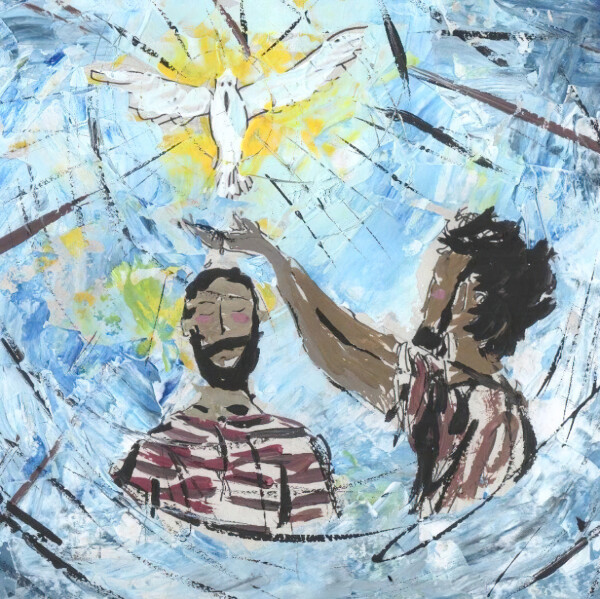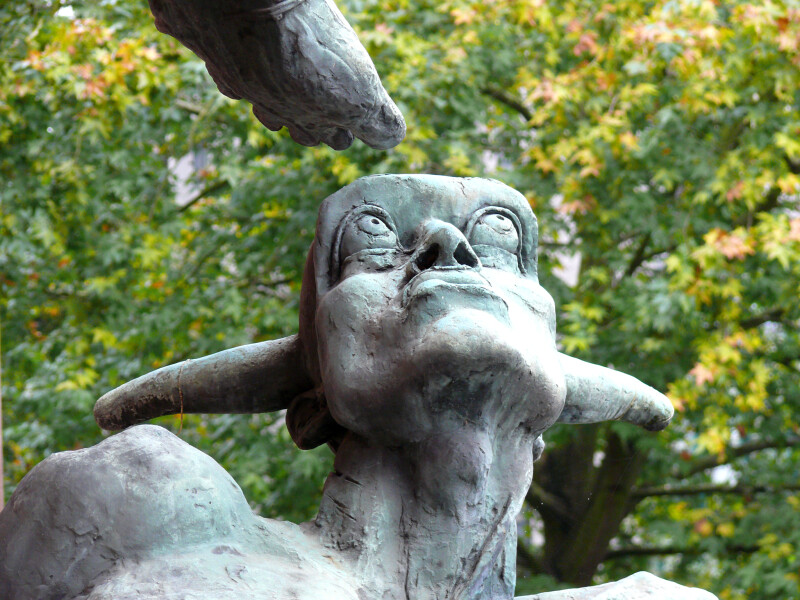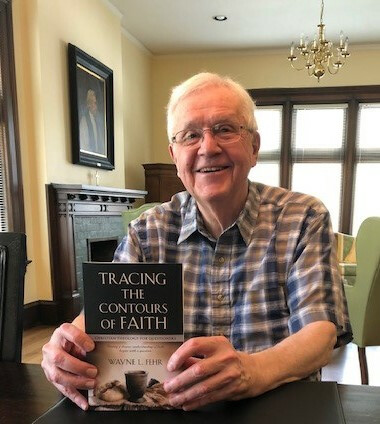Ask a Theologian: Baptism of Jesus

Dear Theologian,
Why was Jesus baptized? Didn’t John’s baptism signify repentance for sins? Yet we say that Jesus was sinless. So what could baptism by John mean for Jesus?
Interested
Dear Interested,
The story of Jesus’ baptism by John derives from an actual historical event, scholars argue, precisely because the tradition was preserved even though it was awkward for Christian believers to deal with. Jesus’ submission to John’s baptism did not seem fitting, somehow. In Matthew’s version, the Baptist first objects that he should be baptized by Jesus, not Jesus by him. And in Luke, the story of Jesus’ baptism does not actually name John as the agent.
In the gospel accounts, there is no indication that Jesus is expressing repentance for his own sins when he goes down under the water. But one might think that he is entering into the larger meaning of John’s baptism: openness to the coming of the Kingdom of God. And some have interpreted his action as an expression of his solidarity with sinful mankind.
Although the gospel tradition provides no clarity about why Jesus submitted to the baptism or what this could have meant to him, it leaves no doubt about the meaning of Jesus’ revelatory experience when he comes up out of the water. This is the culminating event, as presented in all three synoptic gospels (Matthew, Mark and Luke). It expresses powerfully the unique relationship of Jesus to God.
Jesus sees the heavens “opened” and the Holy Spirit descending upon him in the form of a dove. And he hears the voice of God: “You are my Son, the Beloved; with you I am well pleased.” (Mk 1:10-11; Mt 3:16-17; Lk 3:21-22)
It is somewhat unclear whether it is only Jesus that experiences the vision and hears the voice of God, or whether others also see and hear. Luke’s version adds the detail that, after his baptism, Jesus was praying. This seems to indicate that the experience was unique to him.
In all three accounts, the baptismal experience precedes any public ministry of Jesus. It is a moment of God-given certainty about his identity as “Son” and as “Beloved,” and therefore also a decisive moment of awareness of his unique vocation and task.
What follows upon this experience is the irresistible impulse to go away into solitude, to be alone with God and with this new self-knowledge.
The time in the wilderness is, then, a period of struggling to interpret rightly the revelation of his unique status and call. He is tempted to false understandings of it, but resolutely chooses the stance of humility and utter obedience to God. Only then is he ready to begin his public ministry, in the course of which he will speak with authority and certainty the message of the Kingdom of God, and will give dramatic signs of the coming of that Kingdom in his exorcisms and healings.
Rightly understood, the story of Jesus’ baptism and the revelation which followed upon it is full of meaning for Christian believers. It may be regarded as one of the “mysteries” of Christ’s life (events with an infinite dimension of depth, to be entered into only through meditation and prayer). It is the mystery of his relationship to God as Father and his profound experience of being “Son.”
This is a mystery in which we somehow share. Upon each of us, too, the Holy Spirit descends with transforming power. To each of us, too, God says, “You are my son / my daughter; with you I am well pleased.”
St. Paul bears witness to this sharing of Christians in the “sonship” of Jesus:
“When the fullness of time had come, God sent his Son, born of a woman, born under the law, so that we might receive adoption as sons [and daughters]. And because you are sons [and daughters], God has sent the Spirit of his Son into your hearts, crying ‘Abba! Father!’” (Gal 4:4-6)
“All who are led by the Spirit of God are sons [and daughters] of God. For you did not receive a spirit of slavery to fall back into fear, but you have received a spirit of adoption by which we cry ‘Abba! Father!’” (Rom 8:14-15)
We enter into our inheritance as sons and daughters of God when we are baptized into Jesus and accept him as our Savior and Lord. As his adopted brothers and sisters, we are able to relate to the unimaginable Mystery of God with utter trust and confidence.
“...in Christ Jesus our Lord ... we have access to God in boldness and confidence through faith in him.” (Eph 3:12) In the Eucharistic liturgy, the presider says, “as our Savior Christ has taught us, we are bold to say, ‘Our Father.”[1]
There is another perspective on Jesus’ baptism which is also basic to our Christian identity as sharing in his mystery. One might view his going down into the water as his submission to the Father’s will and his dedication to the unique vocation he was given. Ultimately, of course, that would involve his being rejected, undergoing great suffering, and dying a shameful death.
He himself uses the metaphor of baptism to refer to the ordeal which lies before him. “I have a baptism with which to be baptized, and what stress I am under until it is completed!” (Lk 12:50)
Our own sacramental baptism signifies our identification with Christ in the Paschal Mystery of his death and resurrection (Rom 6:3-11). This means that we, like Jesus, dedicate ourselves to the vocation God gives us and that we, like him, submit humbly to the will of the Father for our lives. In a way, our baptism signifies our taking upon ourselves our own unique sharing in the mystery of God’s redeeming love for the world.
What Jesus says to James and John, he also says to each of us who have been given a share in the meaning of his baptism: “The cup that I drink you will drink; and with the baptism with which I am baptized, you will be baptized.” (Mk 10:39) Knowing what this implies, we might be afraid, but we trust utterly in the Father, as Jesus did. “If we have been united with him in a death like his, we will certainly be united with him in a resurrection like his.” (Rom 6:5)
Faithfully,
The Theologian
The Rev. Dr. Wayne L. Fehr wrote a column for a previous version of the diocesan newsletter called Ask a Theologian. He answered questions from ordinary Christians trying to make sense of their faith. Now he's back with a monthly column once again. You can find and purchase his book on Tracing the Contours of Faith: Christian Theology for Questioners here.
[1] BCP, p. 363, emphasis added.



